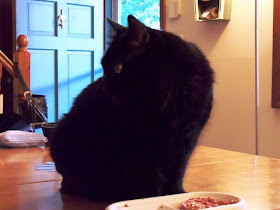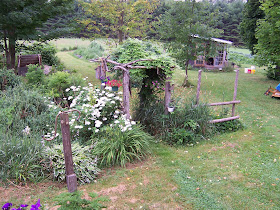My friend Danika @ The Lesbrarian alerted me to this blog post at The New Yorker: What We Talk About When We Talk About Men Not Reading by Macy Halford @ The Book Bench. The post was written in response to a recent article in Publisher's Weekly about the body count in the publishing industry: the fact that there are more women in the book trade then men. They speculate, "does the lack of men in publishing hurt the industry?" meaning, does the higher proportion of women in publishing mean that fewer books of interest to men will be published? (queue hand-wringing).
 |
| Man watching books by Davide Rappucci @ Flickr.com |
The article does nod at the problems of low pay and "gendered jobs" (and doesn't nod at the fact that there are indeed many books "for men" published each year), but if we're going to continue having this conversation, and it seems that we are, I think we should stop conflating the issues, of which there are four, at least:
- Reading practices among men.
- What gets published and what doesn't (and the reasoning behind it).
- Low-paying, dead-end entry-level jobs in publishing (and the structuring of the entire industry).
- Women being willing to take these jobs and men not being willing and/or senior editors' hiring practices.
Each of these needs more serious investigation before we can draw any conclusions, but I'm fairly certain that, however low reading rates among men are, the blame for them can't be laid at the feet of the army of female assistants. So let's stop talking about them as if they could.
A couple of observations I would add to Halford's (really good) list of things we need to think about when we think about boys and men reading.
The first is the fact that these conversations about boys and men reading are curiously separated from the conversations about men writing, and that both of these conversations about men + books are ahistorical. With all the brouhaha recently surrounding Jonathan Franzen's place in the American literary scene and the way we gender writing (by style, by genre, by level of "serious" literary merit), it seems clear to me that as a culture we sex-type the activities of writing and reading, expecting different types of writing and reading from individual people based on their gender. Yet most of these conversations in the mainstream media take as a common sense fact that male and female human beings approach these activities differently, rather than questioning the belief that one's sex, gender, and (implicitly) perhaps one's sexuality shapes one's reading and writing habits. In scholarly terms, this is known as "denaturalization": taking something that we assume to be "natural" or "innate" and examining how and why we have come to this belief, and whether it is, in fact, true according to the evidence.
The first is the fact that these conversations about boys and men reading are curiously separated from the conversations about men writing, and that both of these conversations about men + books are ahistorical. With all the brouhaha recently surrounding Jonathan Franzen's place in the American literary scene and the way we gender writing (by style, by genre, by level of "serious" literary merit), it seems clear to me that as a culture we sex-type the activities of writing and reading, expecting different types of writing and reading from individual people based on their gender. Yet most of these conversations in the mainstream media take as a common sense fact that male and female human beings approach these activities differently, rather than questioning the belief that one's sex, gender, and (implicitly) perhaps one's sexuality shapes one's reading and writing habits. In scholarly terms, this is known as "denaturalization": taking something that we assume to be "natural" or "innate" and examining how and why we have come to this belief, and whether it is, in fact, true according to the evidence.
A little awareness of historical change over time might aid the cause of this denaturalization. Today, for example, it is "common sense" that men prefer non-fiction to fiction; in the late 18th and early 19th century fiction was considered dangerous for women's physical and moral well-being. Reading was coded as a masculine activity; now it is coded feminine. The fact that we have seen a shift over time in our understanding of how reading and gender relate suggests that what we believe to be true about men and their relationship (or non-relationship) to books and reading is at least in part culturally constructed.
Which leads me to my second observation: the fact that the assumption underlying the majority of these stories about men + books is that books for "men" and books for "women" are two distinct categories. Or, at the very least, that they are highly differentiated: perhaps overlapping a bit in the muddy middle, but on the whole make up an industry that is sex-typed by shelves of books for "him" and shelves of books for "her." If we didn't believe that gender mattered in relation to reading habits, then there would be no cause for alarm about the gender of the people involved in making publishing decisions -- aside from a concern about economic inequality.What if, instead of being preoccupied about the gender of the people choosing books, we asked (for example) about their expertise in certain fields of nonfiction and literature? Their depth or breadth of knowledge about (for example) science fiction and fantasy literature? graphic novels? genre romances? nonfiction military histories? science journalism? I have known women and men who read and enjoy all of these categories of printed matter, and who are knowledgeable about current trends.
Yet despite our own anecdotal experience (which, I admit, cannot stand in place of solid social science analysis) that the individual men and boys in our lives do, in fact, read -- and read across a great variety of publication type, writing style, and subject matter -- the idea that men and women approach reading differently is a powerful narrative because gender in our culture is a powerful organizing narrative. We take for granted that men and women are innately different, and so it makes "sense" according to our narrative of the world that women and men would read differently, and read different things. Sadly (or happily, depending on your point of view!) the fact that this is a powerful story that we tell ourselves, and that it makes sense does not also make it right or useful.
I just finished reading a book on brain organization theory by sociomedical scientist Rebecca Jordan-Young called Brain Storm: The Flaws in the Science of Sex Differences. I plan to write up a booknote on Brain Storm once I've digested it a little more, but for now the point I want to make is this: the scientific evidence we currently have to support the commonplace idea that male and female brains are differently organized (and thus process the world, including books and reading) differently because of their sex is weak at best and often poorly-conducted and poorly-reported science. This is not to say differences in brain organization have been categorically disproved -- it simply means that there is no solid evidence to support what most Americans understand to be proven fact.
Which brings me back to men + books. Since we're primed to believe there's a difference between men and women when it comes to reading habits, we see statistics like the gender imbalance in the publishing industry and it fits with our expectations concerning men and reading to interpret that imbalance as somehow related to men's (supposed) disinterest in books, or interest in different books than those women are interested in. We construct a gender-based explanations, rather than stopping to ask a) if the imbalance is problematic, and b) if so, how is it problematic? rather than assuming we already know.


















